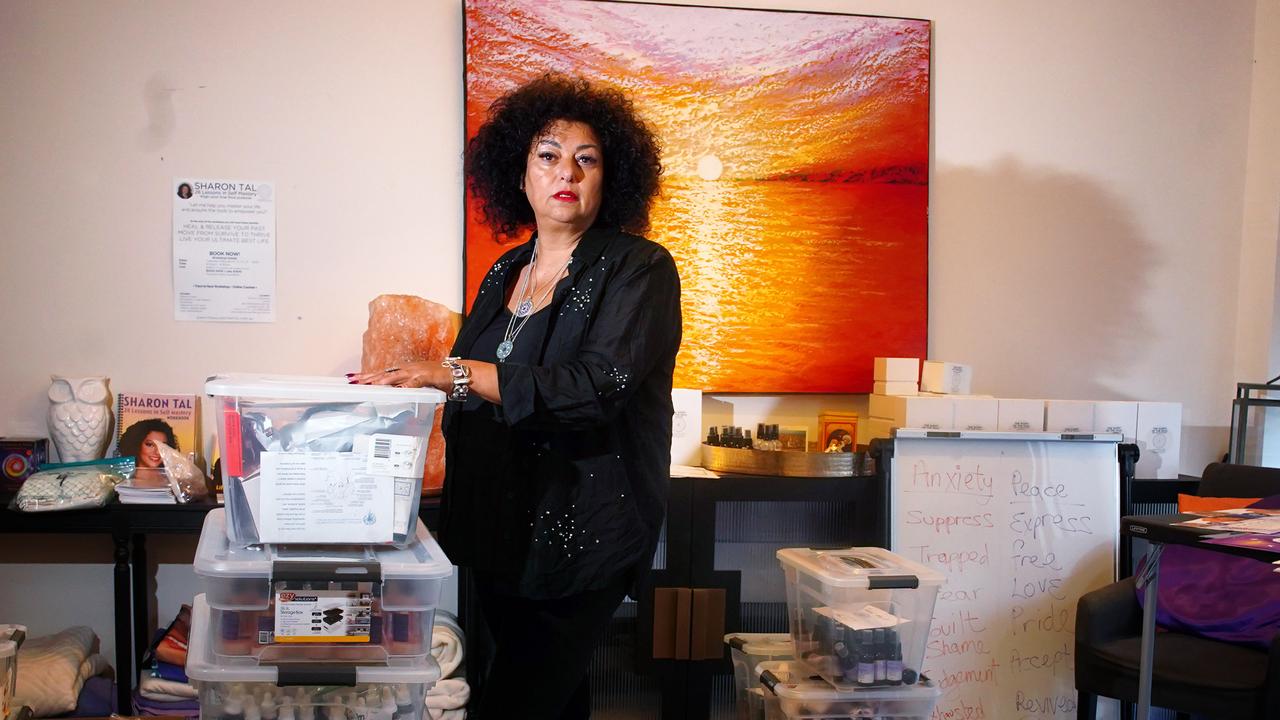Saturday Insider: How Brett Sutton became the most powerful man in Victoria
Insiders reveal the tiny change that turned Brett Sutton into the most powerful, and accountable, man in the state.
Victoria
Don't miss out on the headlines from Victoria. Followed categories will be added to My News.
Late last year, a subtle change was made to the way Victoria’s health directives — which can shut down the state during a pandemic — were signed off.
Chief Health Officer Professor Brett Sutton became the only man wielding the mighty
pen.
The orders were his alone. No delegation to deputies or sharing responsibilities.
According to one person who had observed him closely, there was a key reason the government wanted this.
Sutton — a popular public figure — would not be able to distance himself and would now own controversial decisions that locked down our state.
“Early on, Brett wasn’t always at meetings where all these decisions were finalised,” a source said.
“The change was so that he would have political buy-in publicly. He would always try to distance himself from things he thought weren’t popular.”
The CHO, as he’s referred to by senior government figures, is an enigma.
A Buddhist who once attended week-long meditation retreats in silence and now lives in the hills on the outskirts of Melbourne, Sutton is hard to pin down.
“He’s a bit weird,” said an insider. “Sometimes he’s so chilled and unaffected by what’s going on around him I think, ‘that Buddhism must be something’.
“He never presented as upset or stressed or cross during meetings, which was often in stark contrast to others presenting.”
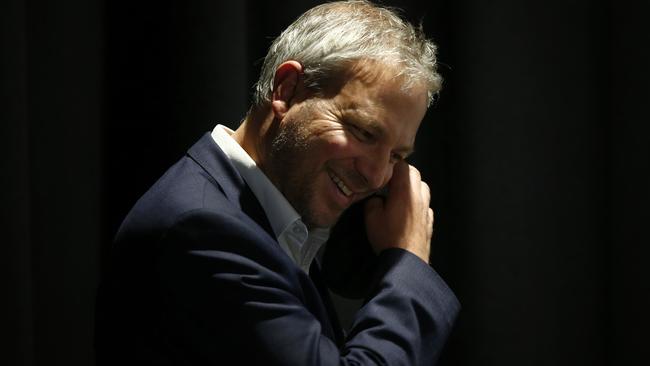
According to ministers and other insiders, the advice put forward by Sutton and his public health team — with deputy Professor Allen Cheng playing an instrumental role since his elevation last year — is used to establish restrictions on community movement.
The advice is not what comes out of Premier Daniel Andrews’ mouth at the end of the day, but it is always a compromise.
In other words there are trade-offs and negotiation, but the final authority comes from Sutton and his team.
“For example, the conversation in meetings could go that if 50 per cent of people went back to work with masks, would you drop off on A or B or C,” one participant in the process said.
“Then it becomes, ‘What is the aggregate impact of these restrictions?’
“It was never ‘Sutton would say A, and the government would say B’, but it’s what happens outside those meetings, and between those meetings, that’s important.”
Ministerial offices and departments would consider impacts on their responsibilities and look at whether compromise positions were possible.
Now, the final result is for Sutton — and Andrews — to own.
Sutton’s role wasn’t always so prominent, or impactful. In fact many people in government would have been hard-pressed to name him before the pandemic.
Before a special crisis council of cabinet was established to deal with the threat of COVID-19, Sutton was a bit-player in a cabinet subcommittee for emergency management.
Most of those crisis meetings were about fire or terror. The CHO wasn’t even present at some.
The fact he has worked part-time on coronavirus at stages of the pandemic rankled some politicians who would scoff at their junior staff taking days off.
Others say there are reasons for the flexible working arrangements.
“People say … he’s a Buddhist, he lives in the hills of Melbourne, and he works part-time.
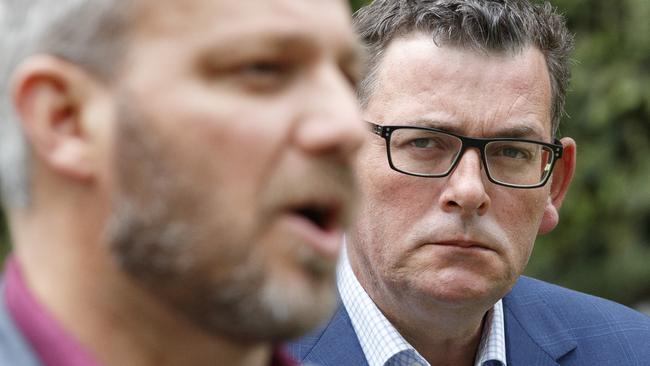
Some of those things are not what you would necessarily recruit during a pandemic,” an insider said.
“Here’s the thing, compared to what they (doctors) could be paid, who would want to be a CHO?”
On paper, Victoria’s chief health officer has less power than in other Australian jurisdictions.
Whereas the chief health officers of other states have almost absolute power over health matters, Sutton and his Victorian predecessors sit at a middle management level in the Department of Health organisational structure and must answer to career bureaucrats.
The arrangement has made for what some in the department describe as an “awkward” history of previous CHOs resigning due to politics.
In fact, Prof Sutton had only recently replaced his former boss Rosemary Lester before the pandemic, after she was forced to fall on her sword after a review of the 2014 Hazelwood mine fire.
The CHO’s power was undermined further early in the coronavirus crisis. Despite Victoria’s pandemic plan calling for the CHO to take on the role of state controller under such circumstances, the Andrews government bypassed Sutton and instead rotated a host of bureaucrats, police and firefighters.
This backfired and was analysed in detail during the Coate inquiry into hotel quarantine bungles.
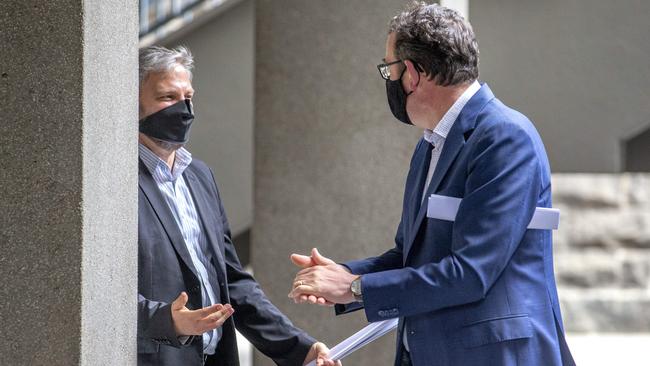
One leading doctor says Prof Sutton’s power is conditional.
“The Premier tolerates Brett because he can hide behind him and say he is just doing what he has been told by the chief health officer,” he said.
“On the other hand, he kind of resents the fact Brett is so popular and takes some of the profile away from him.”
Senior ministers have made similar observations.
Regardless of what the management structure shows on paper, others say a doctor is duty-bound to stand up to authority in the same way Anthony Fauci operated under former US president Donald Trump.
One health source said although it was convenient for Mr Andrews to publicly present an image that Sutton was calling the shots, the reality was not as certain.
“The Fauci attitude is what we should expect from our chief health officers. Brett is a lovely guy, but you can look to other states to see more assertive examples,” the source said.
“The Premier steps in to try and spin the story when he wants to, but will hide behind the chief health officer on other
occasions.
“I think he (Sutton) resents it, but he understands that he is tolerated so long as he toes the line.”
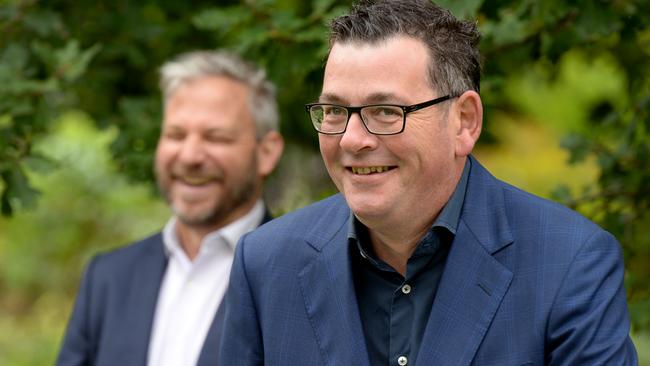
There is little confrontation in the room when final decisions on lockdowns are made — that may happen behind other closed doors.
The discussions at a cabinet level are not stagnant or one-way traffic, however.
Debate on the impact of restrictions contained in advice is normal, ministers say, because sometimes there isn’t scientific consensus.
Occasionally, the way Sutton goes about his job has rankled those at the very top.
While Daniel Andrews has never directly attacked the CHO in meetings, he has on occasion certainly directed his ire towards the public health teams — which Sutton leads.
“(The Premier) would sometimes express frustration at the inconsistency of advice and the changing of advice,” an insider said.
Publicly, Andrews’ default position is to remind everyone he has acted on the science and advice from the public health team.
“I am not just about ignoring that advice,” Andrews repeatedly said last week about his five-day lockdown.
His intention, those close to him point out, is to shift more responsibility to the public health team and elevate their perceived power.
“Dan always hides behind him (Sutton) and says it’s public health advice, which is convenient,” one insider said.
“But at the end of the day, it’s the government that’s going to wear it if something goes wrong.”
More Coverage
Originally published as Saturday Insider: How Brett Sutton became the most powerful man in Victoria




